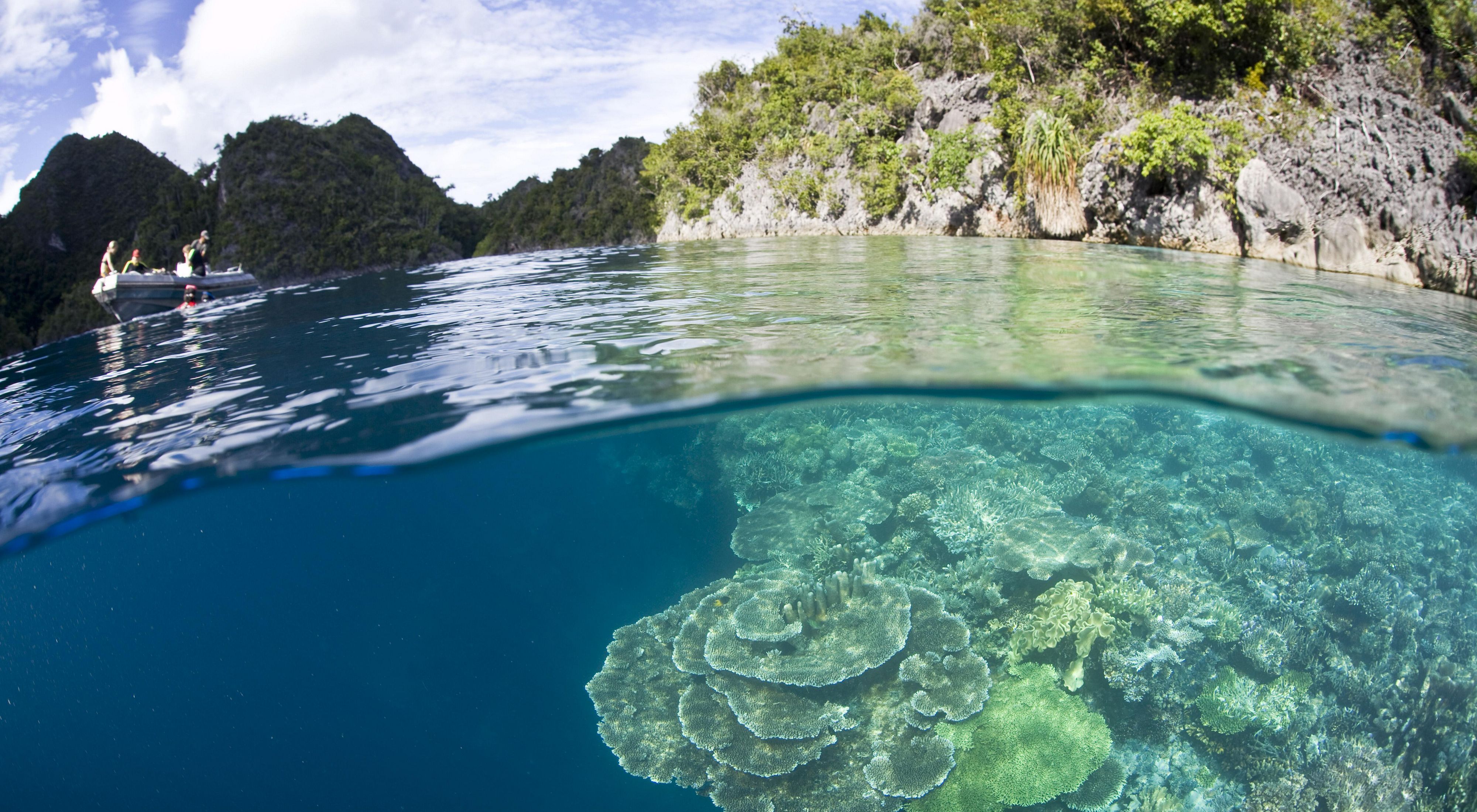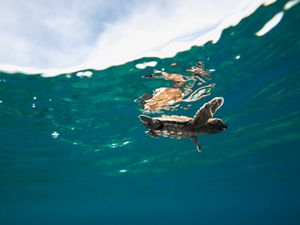Protecting the Bird’s Head Seascape
The Nature Conservancy joins the United States and Indonesia in a $35 million deal that helps protect a global jewel of marine biodiversity.
In the far eastern reaches of Indonesia, the Bird’s Head Seascape is an expanse of crystalline waters, lush islands and coastal villages that spans an area nearly the size of Great Britain and includes the famed Raja Ampat archipelago.
Biologists call it a crown jewel of the natural world: Bird’s Head is home to about three-quarters of the world’s coral species, as well as migrating whales, fleets of giant manta rays and leatherback turtles. Communities have sustainably managed these waters for centuries, deriving food and income. But encroaching development and illegal and destructive fishing practices have damaged shallow reefs and vulnerable coasts.
That’s why a new landmark initiative that brings together government, conservation groups and communities is bringing much-needed hope to the Bird’s Head Seascape’s future.
In July 2024, the governments of the United States and Indonesia—alongside The Nature Conservancy (TNC) and partner NGOs—signed a US$35 million debt-for-nature swap agreement under the U.S. Tropical Forest and Coral Reef Conservation Act, signed into law in 1998.
Over the past 25 years, the legislation has enabled countries to invest funds that would have been used to pay off debt to the US to protect tropical forests and reefs.
The new agreement marks the first time that the TFCCA has been used to protect marine habitat and coral reefs in Indonesia. It will significantly bolster the current protection and conservation of coral reef ecosystems in the Bird Head’s Seascape and the Lesser Sunda-Banda Sea—both areas of focus for TNC’s main partner in Indonesia, Yayasan Konservasi Alam Nusantara (YKAN).
“In the Bird’s Head Seascape, YKAN has been supporting the government by working closely with the local communities and other partners to safeguard the health of marine ecosystems,” said Herlina Hartanto, YKAN’s Executive Director. “For example, we have been supporting coastal communities in putting in place their local wisdom and practices, such as sasi, that regulate marine resource use.”


In 2004, TNC and YKAN, along with other local and international stakeholders, created the Bird’s Head Seascape Initiative, a working partnership designed to help protect this precious seascape while enabling Indigenous communities to protect their traditions and economic security.
Our work in the Bird’s Head Seascape aims to:
- Expand and strengthen the MPA network to ensure the health of this unique ecosystem;
- Demonstrate a successful, locally managed MPA network model through innovative oceans and fisheries management solutions and community enterprise management models; and
- Secure the long-term benefits and financial sustainability of the MPA network.
Bird’s Head Seascape: By the Numbers
-
70%
contains over 70% of the world’s coral species
-
1,800
over 1,800 species of reef fish
-
22m
hectares with over 2,500 islands and reefs
-
775k
people with rich, diverse cultures and traditions

Raja Ampat Archipelago
Rajat Ampat is the undisputed heart of Indonesia’s tropical marine diversity and the linchpin for TNC’s conservation efforts in the Bird’s Head Seascape. These rich waters provide over 45,000 people living in 117 villages with food, livelihoods and shelter and help to buffer communities from tropical storms. TNC has been working in Raja Ampat for almost two decades to build a governance structure, develop policies, involve communities in program management and implementation and provide environmental education. We are also helping to conduct regular biological and socio-economic monitoring and establish a management system, supported by an entrance green fee.
In addition, TNC and YKAN are working with several village governments to advise on green infrastructure projects that reap benefits for communities as well as the Bird’s Head Seascape’s ecological health. Our village government partners are now improving sanitation and drainage requirements in coastal developments to reduce reef-damaging run-off as they work to reform village-level infrastructure plans. Together, such reforms not only help nature but also make communities more attractive to ecotourists drawn to Raja Ampat’s unparalleled dive sites.

North Misool Island
In order to address threats to coastal communities in North Misool—including overfishing from both small fleets and large vessels and the influx of global tourism attracted to the beauty of the Bird’s Head Seascape—TNC and YKAN are working with partners to safeguard the health of coastal and marine ecosystems through improved fisheries management for the people of Misool.
TNC and YKAN are working to establish a site-based, fisheries management program in North Misool Island waters. Both the government and communities are supportive of the idea of protecting their fisheries’ resources. All planned activities—including baseline studies (biological, social and economic), regular dialogues with the community to establish a fisheries management area, stakeholder meetings for a coastal spatial plan—provided a solid foundation for the program.

Southeast Misool
In Southeast Misool, TNC and YKAN helped strengthen coastal communities’ capacity to administer Sasi, a traditional method of resource management that practices the opening and closing of fishing areas for a limited time. In Folley and Kapatcol villages, TNC and YKAN used rapid scientific assessment to help the communities decide which areas are suitable for Sasi. This is critical, because communities are now better informed and able to make decisions that lead to higher diversity of species and higher profits for their communities. The area the community has decided to monitor through Sasi encompasses 326 hectares of coastal and shallow waters.
In addition, TNC and YKAN trained community members to monitor the Sasi area regularly and ensure the implementation of harvest rules, including recording and reporting. TNC and YKAN also conducted trainings for Waifuna, a women’s group in Kapatcol village, on sea cucumber biology and processing. As a result of these trainings, the group was able to independently carry out sea cucumber harvesting while following sustainability guidelines.
Protect the Global Jewel of Marine Biodiversity
Join us to build a sustainable future for nature and people in the Bird's Head Seascape
Donate NowSign up for Nature News
Sign up to receive updates about TNC’s conservation work around the world.





